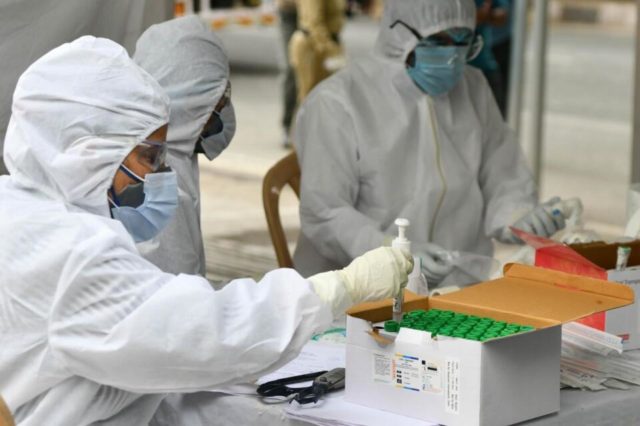Call for public to act against corruption.
THE SOUTH African Council of Churches (SACC), the Ahmed Kathrada Foundation, the Desmond and Leah Tutu Legacy Foundation, the Nelson Mandela Foundation, the Foundation for Human Rights and the Council for the Advancement of the South African Constitution (Casac) have called on the public to act against corruption.
“There comes a time when the moral depravity of some in positions of authority, and in the private sector, undermine the very notion of nationhood and the underlying value of public service,” the civil society organisations said in a joint statement on Saturday.
“After years of state capture and unethical governance, and more recently, large scale looting of Covid-19 emergency funding, that time is upon us. We are compelled to assert: This is not how we shall be known as a nation. We refuse to allow corrupt networks in different provinces to go about their criminal activity, trampling on the rights of honest and law-abiding people,” they said.
Therefore, the organisations called on all who live in South Africa to act against corruption. In the next week, the SACC and its partner organisations would work with a number of other formations, academics, and legal experts to mobilise a comprehensive societal response against corruption.
This included the reopening of the “unburdening panel” for whistleblowers and public servants to report corruption, as well as a national call for the public to demonstrate their outrage at not only the looting, but the lack of consequences for it.
In a build up to this, the organisations called on the public to make the following pledge:
“On building an ethical state:
– Refuse to allow constitutional rights to be eroded by a network of thieves and thugs. Corrupt politicians, business people, officials, and professionals must not ‘get away with murder’. By preventing looting during a pandemic, we can indeed be the difference between life and death;
– Name and shame the corrupt, and support and strengthen honest public servants and whistleblowers; and,
– Call for government to ensure that all public representatives and political party executive committee members, and their immediate families, as well as all civil servants not be allowed to conduct business with the state.
“On transparency:
– Demand that budgets for all Covid-19-related contracts at all levels of government are made public, along with the unit prices paid per item/for services; and,
– Demand that government makes public its spending of the R500 billion stimulus package, and call on the Solidarity Fund to do likewise. Practical measures should be put in place to ensure all further expenditure of these funds, as well as the International Monetary Fund (IMF) loan, is made public in real time.
“On accountability:
– Demand that government recoups all funds lost through irregular and corrupt Covid-19 contracts; and,
– Use whatever means of mobilisation possible under Covid-19 restrictions to make it known to government that we will not accept its ‘paper commitments’ about tackling corruption. Ensure that those implicated in corrupt activities are investigated and prosecuted. We want to see the corrupt in jail.
– The state cannot tell us that they did not know that the ‘predators’ were waiting to ‘eat’ early on in the pandemic. The SACC warned about this in April and called for specific Covid-19 corruption busting measures.
– Likewise, in May, the Kathrada Foundation and several civil society organisations made practical recommendations to monitor how the R500 billion was going to be spent by government. These included transparency and the effective use of the online portal of the e-tender system, and the involvement of trustworthy people outside of government to help monitor the use of funds and resources.
– Casac has for some time called for the establishment of a dedicated independent anti-corruption entity with teeth.
– The Foundation for Human Rights has called for accountability and visible consequences for corrupt acts; for without that, we have unbridled impunity. Weak law enforcement mechanisms, poor investigations, and too few prosecutions regarding corruption, feed into this impunity.
– The Nelson Mandela Foundation has been advocating for developing a social contract by and with the people. Such a social contract must be mounted on the principles of integrity and ethical conduct.
– The Tutu Legacy Foundation, at the death of Rivonia trialist Andrew Mlangeni, highlighted that he ‘continued to speak out against corruption, for morality and fairness within his beloved ANC and in government’. He said, ‘I did not go to prison for 26 years for people to steal from the poor’. The Tutu Legacy Foundation calls for South Africans to develop a new values-based social compact, with young people in the vanguard.
“Many older South Africans, with vivid memories of apartheid and the struggle, may possibly find it difficult – almost unpatriotic – to criticise or hold the ANC government they brought to power, to account. Our society must break out of that mould. Those who lead and represent us must be held to the highest ethics regardless of their political affiliation.”
As Archbishop Emeritus Desmond Tutu warned in 1998: “The price of freedom is eternal vigilance. We so easily jettison the ideals we had when we were struggling. It is important that we retain the vigour of our civil society organs that were part of the struggle … we’ve got to retain the same capacity to smell out corruption, the abuse of power … if they (the government) are the true democrats which we hope they are, they will say: ‘Those are in fact our true friends – the ones who tell us when things are not right.”
“Let us all close ranks and unmask those from within the public and private sector who appear to want to serve society, but have nothing but their own interests at heart; let there be consequences for the corrupt; and let us recover what rightfully belongs to the people,” the organisations said.
– African News Agency (ANA)








